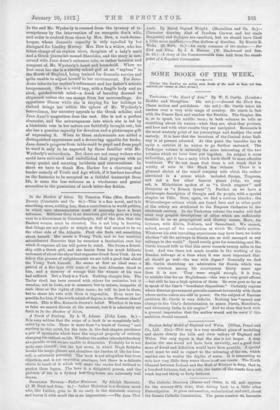In the Shadow of Islam. By Demetra Vkica (Mrs. Kenneth-
Brown) (Constable and Co. 8s.)—This is a fine novel, and it is something more, nothing less, than a contribution to world polities, in which race characteristics must of necessity have a large influence. Millicent Grey is an American girl who goes on a long visit to a kinswoman in Constantinople, full of the idea that tho Eastern woman must be elevated. She is not long in learning that things are not quite so simple as they had seemed to be on the other side of the Atlantic. First she finds out something about herself. She meets a Young Turk, and to her wrathful astonishment discovers that he exercises a fascination over her which it requires all her will power to resist. She forms a friend- ship with a Greek girl, and she learns from her much hitherto undreamt of about the abyss that separates Greek from Turk. As we follow this process of enlightenment wo are told a good deal about the Young Turk himself. He seems at first an ideal man: a patriot of a fine typo with some of the best Albanian blood in him, and a memory of wrongs that the women of his race had suffered. But a Turk is a Turk. Nothing changes him. The Tartar stock has been crossed with others for centuries, but it remains, not in looks, nor in manners, but in nature, incapable of such ideas as the rights of other races ; ho will be just to them, but to share his rule with them is impossible. Even more im- possible for him, if the words admit of degree, is the Western idea of women. This is Mrs. Kenneth-Brown's belief. Whether it be true or false we cannot discuss at the moment, but it is admirably set forth in In the Shadow of Islam.










































 Previous page
Previous page